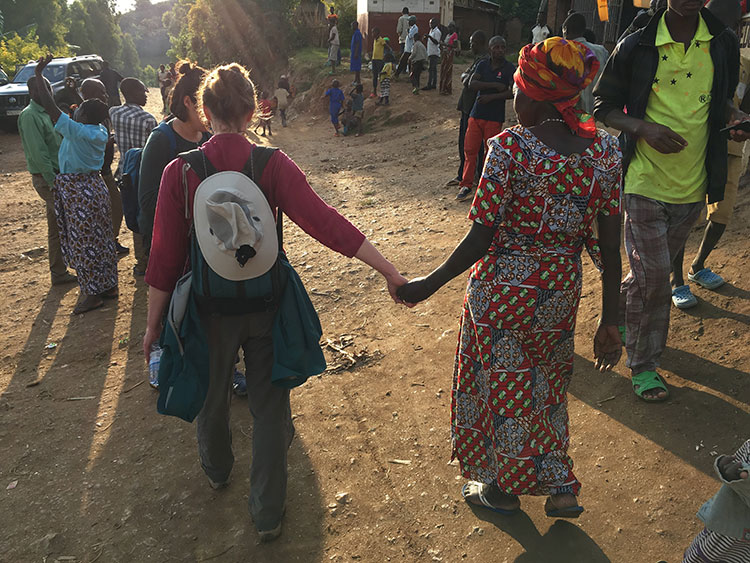Field Notes from Rwanda: Arbor Teas Visits the Land of 1,000 Hills
Posted by Lea @ Arbor Teas on 14th Feb 2021
read time 7.5 minutes
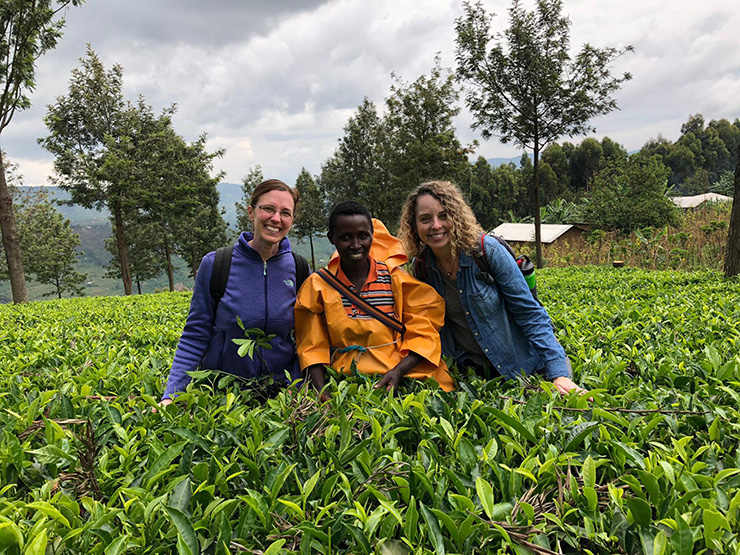
In early January, I had the amazing opportunity to travel with Aubrey to Rwanda to visit Sorwathe tea factory and estate. Located 6,500 feet above sea level in the Cyohoha River valley in northern Rwanda, this stunning Fair Trade Certified tea garden produces our Organic Rwanda Black Tea and Organic Rwanda Silver Needle Tea. Known as the “Land of 1,000 Hills,” this tiny land-locked country ripples with steep verdant hillsides including the Virunga volcano range which is home to the endangered mountain gorillas. Located in east-central Africa, Rwanda lies a mere 75 miles south of the equator, 880 miles west of the Indian Ocean and 777 miles east of the Atlantic Ocean – literally nestled in the the heart of Africa.
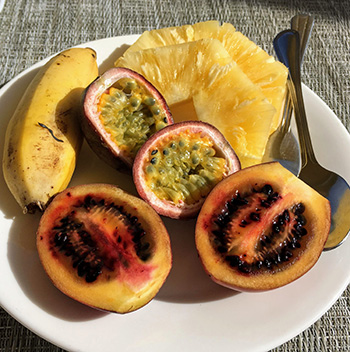
After a very long (yet thankfully uneventful) 2-part plane ride Aubrey and I arrived in the capital city of Kigali, leaving behind a very cold and wintery Michigan. We were immediately delighted by the temperate weather - it was in the mid-60’s and 70’s for our entire trip! And we were surprised by the orderly traffic. Honking is rare, and the drivers are rule-followers. I mentioned to our taxi driver that I was really impressed by the cleanliness of the roads and the city, in general. He proudly explained that on the last Saturday of every month all citizens of Kigali (including the president of Rwanda) participate in community service to clean the city. Additionally, Rwanda banned plastic bags in 2008. Over the course of our travels we observed that very little material of any kind is littered or goes to waste.
We arrived in the evening, and after attempting to get a good night’s sleep (to shake off the jet lag), Aubrey and I were ready the following morning to explore a little of Kigali. We enjoyed a delicious breakfast that included flavorful local fruit (passion fruit, citrusy small bananas, tree tomatoes & juicy pineapple), then walked uphill to the city center and exchanged money (crisp $100 bills were preferred, with a rate of about 940 Rwandan Franc to 1 USD). Our next stop was the Kigali Genocide Memorial.
Created for the purpose of educating and healing, the Kigali Genocide Memorial details through words, photographs and artwork the full history and aftermath of the Rwandan genocide of 1994. The memorial grounds feature beautiful healing gardens and a mass gravesite for survivors and relatives to visit and honor lost loved ones. An estimated 800,000 to 1,000,000 Rwandans were killed during the genocide, devastating this small country. The memorial helped us to better appreciate this history and understand how it affected everyone we would meet. While the experience of visiting the Kigali Genocide Memorial was heartbreaking, we were heartened to observe the great resilience of the Rwandan people during our visit and witnessed ample evidence of hope, strength, forgiveness and joy.
From the city of Kigali, we traveled north to the Rulindo district, to visit the Sorwathe (Sor-wah-te’) Tea Factory and Plantation. As we drove up and down the lush hills, Aubrey and I observed busy foot and bike traffic with people ferrying large quantities of fruits, potatoes, corn, carrots and more along the side of the road. The hills and valleys of northern Rwanda with its iron-rich red soil provide Sorwathe with ideal growing conditions for thriving organic tea. The weather is stable, and this region is advantageously buffered from the harshest effects of climate change. Also, the Sorwathe manager explained that the tea in this area has no natural pests, which is a real boon for organic farming practices!
We stayed in the Sorwathe Guest House, which offered stunning views of the surrounding hills and rolling tea gardens. In the morning, a sea of white mist blanketed the valley in soft waves of cottony magic.
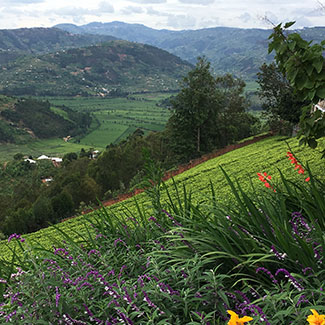
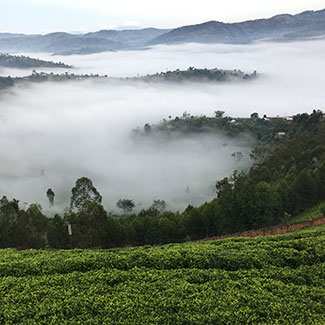
On our first morning we visited the gardens where Beatrice, with nimble hands and a big bright smile, gave us an impressive tea-plucking demonstration. This energetic mother of five is a top-harvester and trainer, overseeing a team of 60 women in the tea harvesting community.
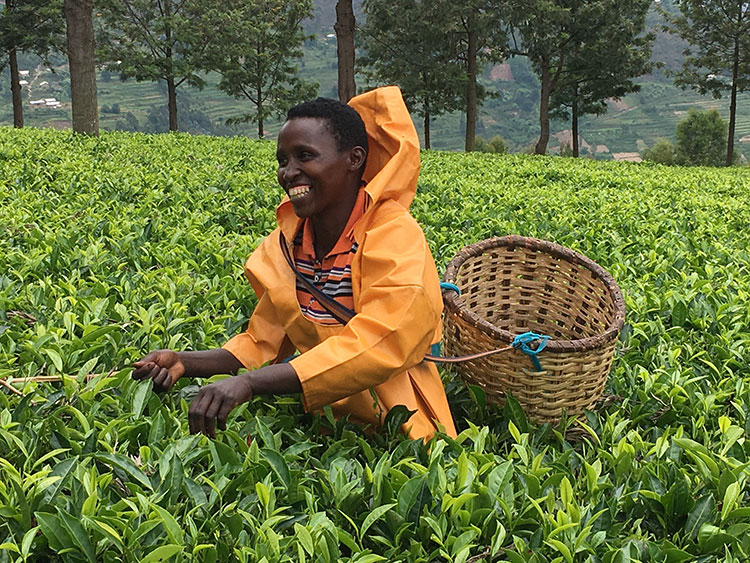
The harvesters not only select the most tender top leaves and a bud, but also prune larger leaves to keep the plucking table level. And this is one sturdy plucking table! The tea bushes are so dense that they could almost hold us upright without our feet touching the ground. Additionally, the dense bushes make weeding unnecessary as no other plants are able to grow underneath. After a single plot (or area) is plucked, it is ready to be plucked again in 5-7 days. Sorwathe ensures that workers earn wages year round (even during the dry season), provide disability pay and a pension, and reward top performers with bonuses for consistent harvest of quality tea leaves. It is also notable that the factory and tea fields survived the 1994 genocide by offering steady employment and on-time pay to both Hutus and Tutsis. In 1998, the Associated Press said “In a country paralyzed by tribal violence, Cyohoha farm [Sorwathe] is rare in hiring workers without regard for ethnicity. Its success stands as an ideal.”
Next we visited the Sorwathe tea factory. The grounds of the Sorwathe factory are quite beautiful featuring attractive brick pavers and lovely flower gardens and plantings everywhere. A full-size train engine is installed near the front entryway as a tribute to the company founder, Joe Wertheim. I was charmed by a fountain in the shape of a teapot pouring tea into a teacup - with the slogan “Sorwathe Is My Cup Of Tea.”
Inside the tea factory office, we were greeted by the factory manager and director - and given overcoats, hairnets, and face masks to wear for the tour. We began at the docks where the freshly plucked tea leaves are delivered in crates from trucks that collect the tea at the weighing stations.
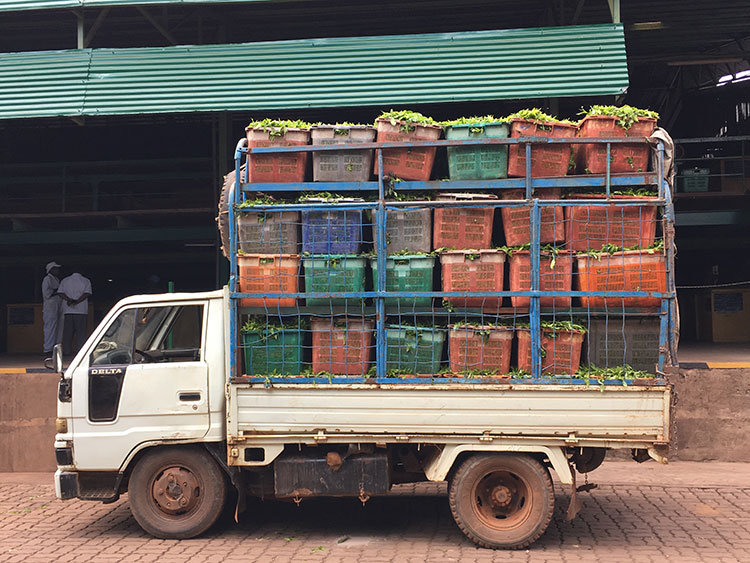
Our guide explained how random samples of tea leaves were selected from the crates, and examined for quality. A compartmentalized sorting box was used to determine if the leaves were tender enough - one tender leaf and a bud, two tender leaves and a bud, perhaps even three tender leaves - and to identity larger, tough leaves. If the sample of leaves was determined to be of poor quality, the truck load of leaves would not be processed, instead returned to the gardens for composting. Once approved, the tea leaves were loaded onto the long withering tables.
The Sorwathe tea factory produces both orthodox and ctc (crush-tear-curl) tea. They use rolling machines, sorting machines, dryers, and ctc machines. All of the processing steps were carefully monitored and timed. During our tour, we were invited to participate in a “quality check” tasting of the tea that was currently under production. We deemed it delicious! The Sorwathe factory uses wood-fired furnaces, fed with locally grown renewable and Rainforest Alliance Certified eucalyptus wood, to generate steam for powering the dryers. The steam is also piped into the steam machines in Sorwathe’s new green tea factory.
Sorwathe is deeply committed to social responsibility. They proudly display how their fair trade premiums have been used to benefit their workers and the community. Examples include supporting the construction of village kindergarten schools and a pre-school nutrition program (providing daily morning porridge), building a hospital and an athletic field. Premiums also helped introduce rocket stoves and solar stoves which allowed for smokeless cooking. They are currently working on an initiative to bring running water to the workers' homes.
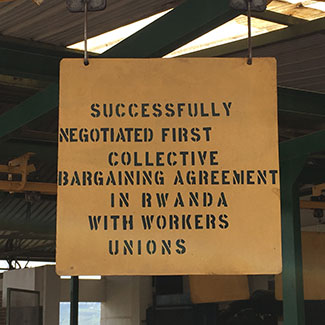
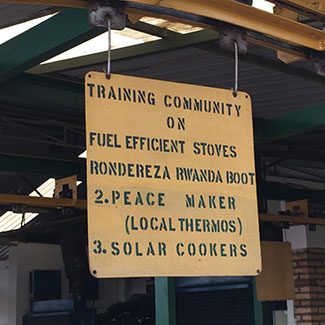
A side trip during our stay at Sorwathe featured a visit to a local women’s basket weaving cooperative. Aubrey and I were treated to an engaging demonstration of how the women separate the fibers from the sisal leaf, and then prepare them for weaving. We also learned about the women’s families, and some difficulties they are having in marketing their beautiful wares. We brought home several baskets including the special, lidded agaseke or “peace basket,” which are a symbol of reconciliation and friendship.
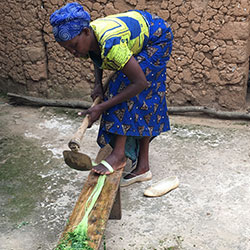
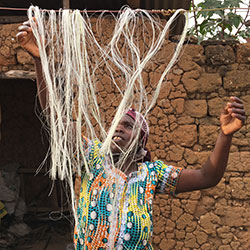
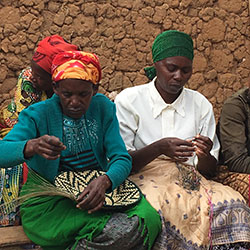
The spirit of social responsibility and community is an integral part of the fabric of Rwanda. Aubrey and I visited several NGOs (non-governmental organizations) and women’s cooperatives during the course of our visit. The cooperatives included the Umutuzo Women’s Cooperative which manages the Ubuzima Healing Garden where the women are using organic practices to grow herbs for local restaurants and their herbal tea blends. We also enjoyed meeting the women at two sewing cooperatives, and another basket-weaving cooperative. These cooperatives are giving Rwandan women a means of generating income to raise themselves and their families out of poverty.
In the city of Gisenyi, in Rwanda’s western province, we were very inspired by the projects implemented by the NGO Hand in Hand for Development (HIHD). They have programs that support economic development for women, and provide assistance to Rwandans who have albinism and people who are HIV-positive. And, using readily available local materials, HIHD is manufacturing bio sand water filters which produce potable water. They are also teaching relocated Twa villagers how to plant drought-resistant perma-gardens, and are providing them with micro-flush composting toilets.
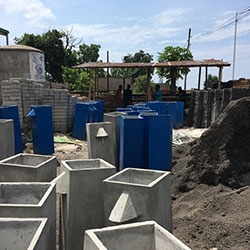
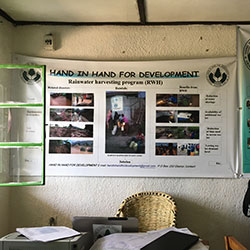
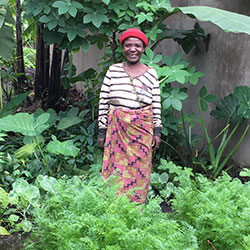
Another NGO we had the pleasure to visit was the Niyo Cultural Arts Centre in Kigali. The center was founded by a young man, Niyonsenga Pacifique, who lived on the streets of Kigali from the ages of 6 to 12, at which time he was fortunate enough to meet a Canadian missionary who befriended him and helped support his education. Now 28 years old, Pacifique has been giving back to the neediest children, with a goal “that every child living in poverty in Kigali has the same opportunity to reach their potential as I had.” The Niyo Cultural Centre currently assists 125 children living in poverty. Pacifique’s students presented us with an uplifting dance, drumming, and song performance that expressed the joy and zest for life which shines brightly in all of these Rwandan youth. Even today, the memory of this performance brings a smile to my face and brightens my heart.
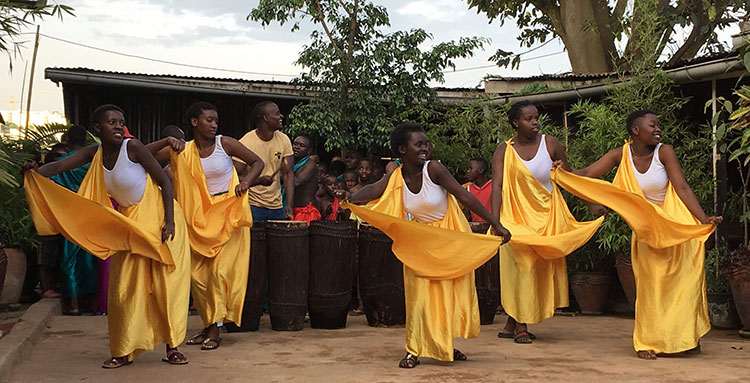
As our time in Rwanda drew to a close, Aubrey and I already shared a desire to come back for another visit. We were buoyed by the unforgettable experiences, stunning scenery and wonderful people that we met in this beautiful country. And we came away with a greater appreciation for the important social initiatives and incredible organic tea produced at Sorwathe. As always, we continue to be incredibly grateful to have traveled to such an amazing corner of our globe, and to have had the opportunity to learn more about the people and places that bring us the tea we love to share with you.
